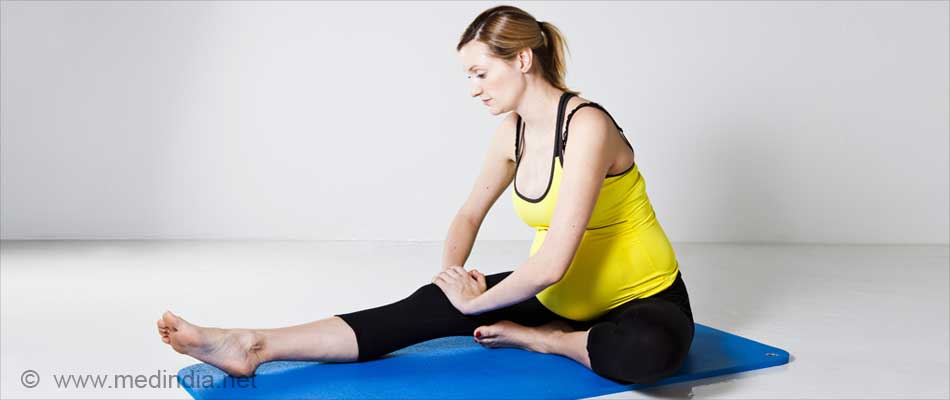Post-natal exercise regimen
Exercise after pregnancy and birth helps in returning to pre-pregnancy shape and gives increased energy to cope with the demands of motherhood. Exercises tone pelvic floor and abdominal muscles. But it is very important to make sure abdominal muscles have healed before doing any vigorous exercises such as crunches.
After a caesarean birth (Improves blood circulation and strengthens respiratory muscles)
While resting in bed, it is important to do bed exercises to prevent problems of chest and blood circulation. Take 5 deep breaths every hour. If the lady needs to cough, she should support her stitches with her hands or a pillow. To improve blood circulation, move the feet forwards and back 20 times every hour and avoid keeping feet in a hanging position.
Long hold (Strengthens pelvic floor muscles)
Squeeze around anus and vagina, as if trying to stop passing wind or urine and try to lift the pelvic floor up. Hold this exercise for 2 to 3 seconds, keeping abdominal, buttock and thigh muscles relaxed. Continue to breathe normally. Relax for five seconds, and then repeat this exercise 3 to 5 times.
C-Curve™ or Hiss-Compress ( Strengthen abdominal muscles)
Sit upright on hipbones. Center the weight, not too forward or backward, neither more to one side nor to the other. Relax abdomen and inhale. Exhale, compressing the abdomen and pulling belly button toward the back. Roll back slightly, continuing to compress the abdomen. Return to upright position.
Kegel Exercises for the Pelvic Floor (Strengthens pelvic floor muscles)
Kegel #1: Squeeze the hip bones together; then inhale .Exhale and release the hipbones
Kegel #2: Squeeze the muscles around the anus, then the one around the vagina and urethra; then inhale. Exhale and release the muscles
Kegel #3: Lift the pelvic floor up inside; then inhale. Exhale and slowly lower the pelvic floor. Start with 3 of each and progress to 10 of each
Weight gain in pregnancy: Practice these exercises post delivery
Excessive weight gain results in storage of fat which is hard to lose after the birth.
- Pull your shoulders down towards your feet. Let go.
- Move your elbows outwards from your sides. Let go.
- Stretch all your fingers out. Let go.
- Roll your knees outwards. Let go.
- Point your feet downwards. Let go.
- Raise and separate your eyebrows. Let go.
- Look up towards your hairline. Let go.
- Drag your bottom jaw downwards. Let go.
- Focus on your breathing.

Deep abdominal muscle exercise (To be done post delivery)
The lower tummy muscle (called the transversus abdominus) works with your pelvic floor muscles to help support back and pelvis. Exercising this muscle helps in loosing ''pregnancy shape'' and flattens tummy. Try this exercise either lying on side or on back with knees bent. Breathe in and while breathing out, tighten pelvic floor muscles. Then gradually release and relax.
Upper back stretches
Sit up straight with arms crossed against chest. Twist to the left and then to the right. Repeat 10 times. Sit and link hands behind your neck. Twist to the left and then to the right. Repeat 10 times. Sit and link both hands together in front. Take arms up in front and above head as far as possible.
Hold for 2-3 seconds and then slowly lower arms down again.
Neck exercises
Sit and slowly turn head to the left and then to the right. Slowly, tilt head, moving right ear down to the right shoulder and then left ear down to left shoulder. Slowly bring head back to the middle and then bend neck towards chest and then backwards.
Warning signs to slow down
Don’t overexert. Body gives out warning signs if exercising too hard, and these signs may include:
- Increased fatigue
- Muscle aches and pains
- Colour changes to post-partum vaginal flow from pink or red
- Heavier post-partum vaginal flow
Post-partum vaginal flow starts flowing again after it had stopped.











